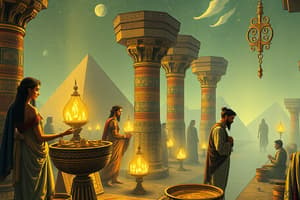Podcast
Questions and Answers
What does the term 'parallel' mean?
What does the term 'parallel' mean?
Moving or lying in the same direction and distance apart.
What is silt?
What is silt?
Fine particles of fertile soil.
What is irrigation?
What is irrigation?
A system that supplies dry land with water through ditches, pipes, or streams.
What does surplus mean?
What does surplus mean?
What is a city-state?
What is a city-state?
What is polytheism?
What is polytheism?
What is a ziggurat?
What is a ziggurat?
What does it mean to 'consist'?
What does it mean to 'consist'?
What is cuneiform?
What is cuneiform?
What is a scribe?
What is a scribe?
What is an epic?
What is an epic?
Why do you think Mesopotamia was a good location for the growth of civilization?
Why do you think Mesopotamia was a good location for the growth of civilization?
How did floods sometimes help farmers?
How did floods sometimes help farmers?
What water sources were available in Sumer?
What water sources were available in Sumer?
How were polytheism and ziggurats related in Sumerian civilization?
How were polytheism and ziggurats related in Sumerian civilization?
Why do you think the Sumerians built cities with walls around them?
Why do you think the Sumerians built cities with walls around them?
Where is the Fertile Crescent? Where is Mesopotamia located?
Where is the Fertile Crescent? Where is Mesopotamia located?
How were the social classes of Sumer organized?
How were the social classes of Sumer organized?
What was the most common role for women in Sumerian society?
What was the most common role for women in Sumerian society?
Why did the Sumerians invent a writing system?
Why did the Sumerians invent a writing system?
Why were scribes important in Sumerian society?
Why were scribes important in Sumerian society?
What ideas and inventions did Sumerians pass on to other civilizations?
What ideas and inventions did Sumerians pass on to other civilizations?
Flashcards are hidden until you start studying
Study Notes
Vocabulary Terms
- Parallel: Describes objects that move or lie in the same direction at an equal distance apart.
- Silt: Composed of fine particles of fertile soil that enrich agricultural land.
- Irrigation: A system that provides water to dry land using ditches, pipes, or streams to support farming.
- Surplus: The excess amount remaining after fulfilling a need, crucial for trade and storage.
- City-state: An independent city that governs itself and the surrounding territory, often functioning as a political unit.
- Polytheism: The religious belief in multiple gods, a characteristic of early civilizations.
- Ziggurat: A pyramid-shaped structure that serves as a temple, typically dedicated to a city's chief deity.
Writing and Record Keeping
- Consist: Refers to being made up of specific components, important in discussions about social structures and resources.
- Cuneiform: An ancient writing system created by the Sumerians, characterized by wedge-shaped marks inscribed on clay tablets.
- Scribe: An individual responsible for writing, copying documents, and maintaining records, critical to administrative functions.
- Epic: A lengthy narrative poem recounting the heroic deeds of significant figures, showcasing cultural values.
Geography and Agriculture
- Favorable Location: Mesopotamia's location along the Tigris and Euphrates Rivers facilitated drinking water access and agriculture due to fertile floodplain soil.
- Flood Benefits: Floods deposited rich silt which bolstered crop growth, demonstrating a complex relationship between natural disasters and agricultural success.
- Water Sources in Sumer: The Tigris and Euphrates Rivers, alongside rainwater and manmade canals, provided vital irrigation and drinking water.
Religious Structures and Social Organization
- Polytheism and Ziggurats: The Sumerians’ worship of various gods influenced the construction of ziggurats, which acted as temples for deities.
- City Security: Walls built around Sumerian cities provided protection from invasions, highlighting societal organization.
- Fertile Crescent: This region extends from the Mediterranean Sea to the Persian Gulf, encompassing Mesopotamia, known for agricultural richness.
Social Hierarchy and Gender Roles
- Social Classes: Society in Sumer was stratified into an upper class (kings, priests, officials), a middle class (merchants, farmers), and a lower class (enslaved people).
- Women’s Roles: Primarily focused on managing households and child-rearing, reflecting societal expectations versus opportunities.
Importance of Writing and Scribes
- Writing System Purpose: Developed to document business dealings and significant historical events, crucial for administration and culture.
- Significance of Scribes: As few in number, scribes played a vital role in recording transactions and preserving Sumerian history and literary works.
Contributions to Civilization
- Sumerian Innovations: Influential inventions and ideas passed on include writing, the wheel, chariots, sailboats, plows, bronze metallurgy, mathematics, and astronomy, shaping future civilizations.
Studying That Suits You
Use AI to generate personalized quizzes and flashcards to suit your learning preferences.




